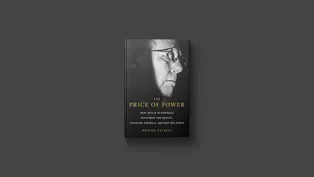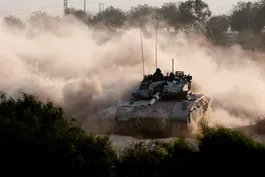
States work to cap methane leaks from abandoned wells
Clip: 10/24/2024 | 8m 21sVideo has Closed Captions
States work to track down and cap dangerous methane leaks from abandoned oil and gas wells
Two major laws passed by Congress and signed by President Biden provide new money and new requirements for reducing potent methane emissions, including those coming from abandoned oil and gas wells. The federal government has started awarding some contracts for capping those wells, but the election could impact whether this work will continue. Science correspondent Miles O'Brien reports.
Problems with Closed Captions? Closed Captioning Feedback
Problems with Closed Captions? Closed Captioning Feedback
Major corporate funding for the PBS News Hour is provided by BDO, BNSF, Consumer Cellular, American Cruise Lines, and Raymond James. Funding for the PBS NewsHour Weekend is provided by...

States work to cap methane leaks from abandoned wells
Clip: 10/24/2024 | 8m 21sVideo has Closed Captions
Two major laws passed by Congress and signed by President Biden provide new money and new requirements for reducing potent methane emissions, including those coming from abandoned oil and gas wells. The federal government has started awarding some contracts for capping those wells, but the election could impact whether this work will continue. Science correspondent Miles O'Brien reports.
Problems with Closed Captions? Closed Captioning Feedback
How to Watch PBS News Hour
PBS News Hour is available to stream on pbs.org and the free PBS App, available on iPhone, Apple TV, Android TV, Android smartphones, Amazon Fire TV, Amazon Fire Tablet, Roku, Samsung Smart TV, and Vizio.
Providing Support for PBS.org
Learn Moreabout PBS online sponsorshipGEOFF BENNETT: Two major laws passed by Congress and signed into law by President Biden provide new money and new requirements for reducing potent methane emissions, including those coming from abandoned oil and gas wells.
Now the federal government has started awarding some contracts for capping those wells.
But the election could impact whether this work will continue, since former President Donald Trump wants to reverse many rules and recently referred to climate concerns as a scam.
Science correspondent Miles O'Brien reports from the battleground state of Pennsylvania on the larger scope of the problem.
MILES O'BRIEN: Deep in the Allegheny National Forest of Northwestern Pennsylvania... MELISSA OSTROFF, Earthworks: I see something through there, yes.
MILES O'BRIEN: ... Melissa Ostroff is blazing trails down narrow roads through thick brush, hoping to see the methane for the trees.
MELISSA OSTROFF: All right, we have to go this way.
WOMAN: It's not through here to get around there?
MELISSA OSTROFF: Oh, this just looks so much easier.
MILES O'BRIEN: Nothing easy about this work.
She's with an environmental advocacy group called Earthworks.
Operating a $100,000 thermal imaging camera able to record plumes of hydrocarbons, she's hunting for methane, or natural gas, often found along with oil, and often found leaking out of oil wells, active or not.
MELISSA OSTROFF: You can hear and see the bubbling that comes from the methane underground, and with this optical gas imaging camera, I'm able to also see that this methane is going into the air.
MILES O'BRIEN: The forests of Pennsylvania are filled with thousands of orphaned and abandoned oil wells, many of them more than a century-old.
History's first oil rush began not far from here in 1859, when Edwin Drake drilled the first commercially viable well.
Pennsylvania estimates there are more than 350,000 orphaned and abandoned wells in the state.
MELISSA OSTROFF: There's no responsible party that we can hold accountable now to clean up the mess that we have here, and so it's just leaking into the air one of these at a time.
MILES O'BRIEN: Methane traps about 80 times more heat during a 20-year lifetime than carbon dioxide.
It is responsible for about 30 percent of human-caused global warming, and about 8 percent of methane emissions in Pennsylvania are linked to orphaned and abandoned wells.
MELISSA OSTROFF: Through this camera it looks like smoke.
I can see it kind of puffing away here.
It's not totally sealed, and that's pretty typical.
MILES O'BRIEN: The Pennsylvania Department of Environmental Protection estimates the average cost to plug a conventional well like this is about $100,000, but this can vary depending on the depth, the condition of the well, and its accessibility.
The cost creates a perverse incentive to keep wells active long past their prime.
MELISSA OSTROFF: They know the cost of plugging is really high, so they're going to try to keep it in that gray area as long as possible, where it's just producing a trickle.
MILES O'BRIEN: The loopholes, the shades of gray, and the dearth of accurate records compound the devilish problem.
MARY KANG, Associate Professor of Civil Engineering, McGill University: There are these documented wells that the states know about, they have records on, and then there are all these undocumented wells.
MILES O'BRIEN: Mary Kang is an associate professor of civil engineering at McGill University.
She and her team were the first to publish measurements of methane emissions from abandoned oil and gas wells.
They started with GPS coordinates gleaned from state databases and local activists.
MARY KANG: There were so many times we get there and we are looking for one well and then we will find five, six, or a dozen, and then you start to ask, well, how many are missing?
MILES O'BRIEN: Kang and other experts estimate there may be a million orphaned oil and gas wells in the U.S., but, right now, only 140,000 of them are documented.
The bipartisan infrastructure bill set aside $4.7 billion to begin tackling the problem.
The Commonwealth of Pennsylvania has used the money to greatly accelerate a well-capping campaign, celebrating its 200th finished project in March.
Governor Josh Shapiro: GOV.
JOSH SHAPIRO (D-PA): Today, Pennsylvania is facing the consequences of a legacy left by an industry that made a buck off our natural resources and then got away with it abandoning these gas wells without properly plugging them.
MILES O'BRIEN: The American Petroleum Institute, which represents oil and gas producers, says it has established strong industry standards to advance the permanent closure and remediation of historic wells and it supports a sound policy framework for bonding and financial assurance to ensure operators can meet their decommissioning obligations.
MELISSA OSTROFF: Typically, I will go straight to the Department of Environmental Protection and file a complaint.
MILES O'BRIEN: Methane is odorless, and yet the forest is pungent with the foul smell of rotten eggs.
It is hydrogen sulfide, a toxic chemical that often accompanies methane.
Other hitchhikers include volatile organic compounds, among them benzene, a carcinogen.
MELISSA OSTROFF: There are health hazards to breathing this in, and you will see tanks like this in people's backyards.
MILES O'BRIEN: Wow.
MELISSA OSTROFF: And it's just freely venting out.
MILES O'BRIEN: Nearby, in Bradford, Pennsylvania, wherever you go or drive through, you will see reminders that this is a city and a region built by, of, and amid oil wells.
Many are still in operation.
At the end of 2023, the Environmental Protection Agency finalized rules designed to detect and control methane emissions from active oil and gas production facilities.
But requirements are relaxed for the small wells so common here.
MELISSA OSTROFF: Yes, they're all over the place here, right next to homes, right next to schools.
MILES O'BRIEN: The tank beside this shed is nestled in a neighborhood.
The smell offered us a telltale of trouble.
We sure are smelling it here.
The camera confirmed it was an open hatch designed to vent methane emissions.
MELISSA OSTROFF: Otherwise, it would explode, and it's unfortunately become just a part of the scenery here.
MILES O'BRIEN: While our cameras were out, we provoked some curiosity and concern.
Maddi Chaussard is a mother of four who moved here in 2020.
Melissa showed her the smoking hatch footage.
It's opened up a crack and that's just allowing it to billow out like that.
MADDI CHAUSSARD, Mother: Is there a way to fix this... MELISSA OSTROFF: So... MADDI CHAUSSARD: ... so that it's not leaking like that?
MILES O'BRIEN: She said summer nights are often the worst.
MADDI CHAUSSARD: The smell was so bad that it would wake me out of my sleep and it would give me stomach aches, headaches, just an overall feeling of sickness.
I don't want to slam anybody's livelihood, but I also don't want my health and my children's health to be in jeopardy.
Watching that video of the chemicals pouring out of those, it kind of like puts evidence to what I have been feeling for the last three years.
MILES O'BRIEN: The evidence is everywhere if you have the ability to look.
It's hard to imagine getting to net zero carbon emissions without stopping the steady stream of leaking methane.
Millions of old holes must be plugged, even as tens of thousands of new ones are drilled every year.
For the "PBS News Hour," I'm Miles O'Brien in Bradford, Pennsylvania.
Boeing union rejects contract, complicating CEO's plans
Video has Closed Captions
Boeing union rejects offer to end strike, complicating CEO's plan to turn company around (4m 16s)
Harris paints Trump as threat to democracy as election nears
Video has Closed Captions
Harris paints Trump as threat to democracy as Election Day draws closer (3m 56s)
How the racial makeup of colleges has changed
Video has Closed Captions
How the racial makeup of colleges changed after the affirmative action ruling (4m 28s)
'The Price of Power' explores McConnell's complex legacy
Video has Closed Captions
New book 'The Price of Power' explores the complex legacy of Mitch McConnell (5m 47s)
Trump's rambling raises questions about mental decline
Video has Closed Captions
Trump's rambling speeches raise questions about mental decline (9m 14s)
Where Harris and Trump stand on key foreign policy issues
Video has Closed Captions
Comparing where Harris and Trump stand on key foreign policy issues (7m 47s)
Providing Support for PBS.org
Learn Moreabout PBS online sponsorshipSupport for PBS provided by:
Major corporate funding for the PBS News Hour is provided by BDO, BNSF, Consumer Cellular, American Cruise Lines, and Raymond James. Funding for the PBS NewsHour Weekend is provided by...

















